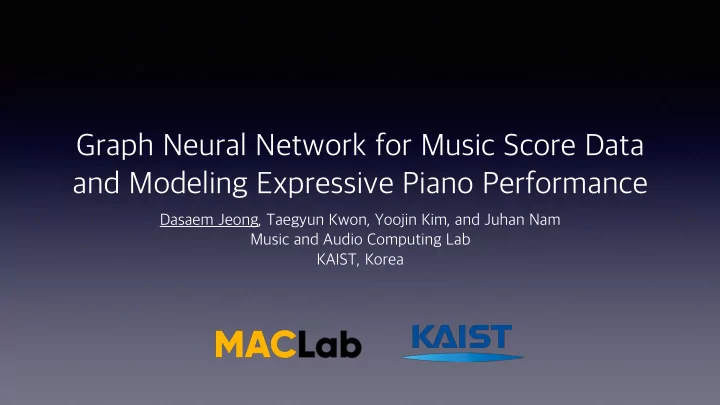

Graph Neural Network for Music Score Data and Modeling Expressive Piano Performance Dasaem Jeong, Taegyun Kwon, Yoojin Kim, and Juhan Nam Music and Audio Computing Lab KAIST, Korea
Research Goal Performance (MIDI) Music Score (MusicXML) Performance Modeling System • Modeling expressive piano performance (aka AI Pianist)
Research Goal Performance (MIDI) Music Score (MusicXML) Performance Modeling System • The core part is embedding music score with neural network.
Previous Representations • Word-like sequence of notes • 2D matrix of notes activation in time and pitch axis
Previous Representations 10 9 8 7 6 5 4 3 2 1 9 8 7 6 5 4 3 2 1 10 • Flatten music score as a word-like sequence of notes • The relation of neighboring element in the sequence is not consistent
Previous Representations 1 10 9 8 7 6 5 4 3 2 10 9 8 7 6 5 4 3 2 1 Appear simultaneously • Flatten music score as a word-like sequence of notes • The relation of neighboring element in the sequence is not consistent
Previous Representations 1 10 9 8 7 6 5 4 3 2 10 9 8 7 6 5 4 3 2 1 Musical neighbor • Flatten music score as a word-like sequence of notes by time and pitch • The relation of neighboring element in the sequence is not consistent
Previous Representations (piano-roll) • Convert music score as a 2D matrix of note activation in time and pitch axis • Sampling-based representation rather than event-based
Our Idea: Music Score as Graph • Each note is considered as a graph node. • Neighboring notes are connected by different types of edges • Gated Graph Neural Network (GGNN)
Music in Extended Context • GNN is suitable for handling the local context of each note. • But music has sequence-like characteristics in extended context
Combining GNN and RNN with Hierarchical Attention Network (HAN) • Summarize note-level representations in a measure
Iterative Update bi-directional RNN • Update measure-level representations with
Iterative Update note-level representations representation again • Feed measure-level representations back into • Update note-level and measure-level
Advantage of Iterative Update context cyclic connection • Note-level representations can be updated considering the extended • It can compensate the lack of auto-regressive decoding in GGNN • Unlike RNN with sequence data, GNN cannot fix the output because of • Named Iterative Sequential Graph Network (ISGN)
Performance Modeling System Perform MIDI MusicXML MIDI Features Perform C Features Decoder Performance Encoder Performance Score Encoder Features Score z • Conditional Variational Autoencoder (CVAE) • Takes music score and (optional) performance MIDI • Input and output is a sequence of in note-level score and performance features
Performance Modeling System Perform MIDI MusicXML MIDI Features Perform C Features Decoder Performance Encoder Performance Score Encoder Features Score z • Score Encoder takes score inputs and embeds it as a score condition C • C is a sequence of note-level hidden representations.
Performance Modeling System Perform MusicXML MIDI Features Perform z C Features Decoder Performance Encoder Performance Score Encoder Features Score inputs and encode the probability of z MIDI • Performance Encoder takes performance features and score condition as • z is a single vector that can be regarded as a ‘performance style vector’
Performance Modeling System Perform MIDI MusicXML MIDI Features Perform C Features Decoder Performance Encoder Performance Score Encoder Features Score vector z and reconstructs the performance features . z • Performance decoder takes score condition C and performance style
Score Encoder Experiment Performance Encoder Performance Decoder C z • Trained 4 models with same module structure but different NN architecture. • Baseline: Note-level LSTM only • HAN: Note-level LSTM, beat-level LSTM, measure-level LSTM • G-HAN: Note-level GGNN, beat-level LSTM, measure-level LSTM • Proposed: Note-level and measure-level ISGN
Experiment Result Reconstruction loss on test set Human listening test • The proposed model showed better result than other models
https://github.com/jdasam/virtuosoNet
Recommend
More recommend